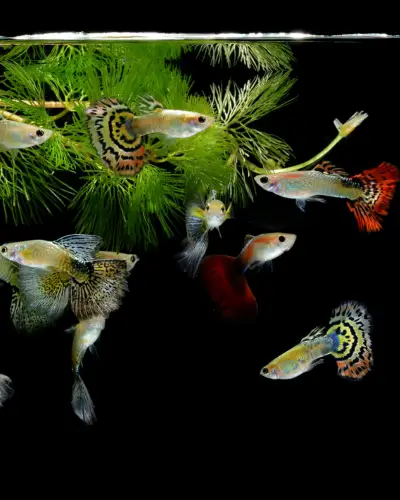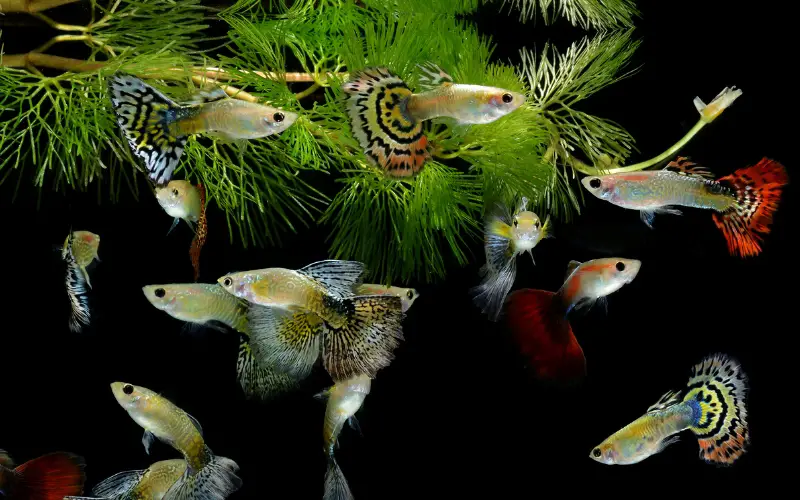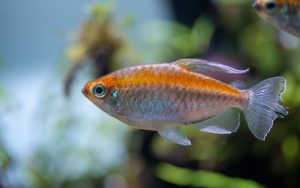Guppies are beloved for their vibrant colors and peaceful demeanor, but what happens when you encounter an aggressive guppy disrupting the harmony of your tank? While these small fish are often associated with a calm and social nature, occasional aggression can turn your aquarium into a battleground.
From nipping at fins to chasing other tank mates relentlessly, an aggressive guppy can cause stress for the entire aquatic community—and for you as a fish keeper. But don’t worry! Understanding the root of this guppy aggressive behavior is the first step to restoring peace in your tank.
How to Calm an Aggressive Guppy? Sometimes, guppies may calm down naturally after a pecking order is established, but relying solely on this isn’t always effective.
To reduce tension, consider adding more male guppies to balance the population dynamics. Additionally, creating safe zones with plenty of hiding places can help alleviate stress for all tank inhabitants.

Floating plants are particularly beneficial as they provide shelter in the upper areas where guppies typically dwell. These strategies not only curb aggression but also enhance the overall environment of your aquarium.
This comprehensive article will delve into proven techniques to stop aggressive guppy fish in their tracks. We will cover everything from creating a well-structured environment to maintaining a balanced social dynamic.
You’ll learn to provide ample hiding spots, establish territories, and ensure a suitable male-to-female ratio to minimize aggression. Additionally, we’ll explore the importance of careful observation and monitoring of your guppies’ behavior. You can effectively manage and prevent aggressive outbursts by identifying triggers and taking appropriate action.
Get ready to take control of your aquarium and restore harmony among your guppies. Let’s dive in and discover how to stop aggressive guppies from causing havoc in your tank!
Table of Contents
ToggleAre Guppies Aggressive with Other Fish?
Are guppy fish aggressive? Guppies are generally peaceful and non-aggressive fish. However, like any other fish species, there can be exceptions.
In some cases, male guppies may display territorial behavior or chase other fish, especially if the tank is too small and they feel threatened or if there is competition for mates.
This guppy fish aggressive behavior is more common among male guppies, as they tend to be more colorful and have longer fins, which can trigger aggression. Providing them with ample space, hiding spots, and a balanced male-to-female ratio is recommended.
Remember, overcrowding or keeping too many males together can increase aggression.

Additionally, ensuring a well-maintained, stress-free environment with proper feeding and water conditions can help reduce aggressive behavior. Monitoring your guppies’ behavior and intervening if aggression becomes excessive or leads to injuries is essential.
Separating aggressive individuals or providing more hiding spots can help alleviate the issue. Aggression among guppies can be managed effectively with proper care and attention, allowing for a peaceful and harmonious aquarium environment.
Who Are Guppies Aggressive Behavior Towards?
Guppies can behave aggressively towards their species and other fish in the aquarium. Male guppies, in particular, can be territorial and aggressive towards other males, mainly if competition for mates exists.
However, female guppies can also display aggression when establishing a hierarchy, particularly towards other females.
Additionally, if guppies feel threatened or stressed due to Overcrowding or poor water quality, they may become more aggressive toward other fish. It’s essential to monitor your guppies’ behavior and ensure they have enough space and suitable community tank mates to prevent aggressive behavior.
What Are the Signs of Aggression?
Signs of aggression in fish can vary depending on the species, but there are other common indicators to look out for. One of the most obvious signs is when a fish becomes a bully, constantly chasing and nipping at another fish.
This guppy aggressive behavior can lead to an injured fish with frayed fins or even death. Aggressive fish display dominant behaviors, such as flaring their fins, puffing up their bodies, or changing colors.
For example, a dominant male may behave aggressively towards other fish, particularly male bettas in a betta fish tank. A dominant male guppy may become territorial and aggressive towards other males in a guppy tank.
Monitoring your fish for signs of aggression is essential to prevent harm and maintain a peaceful and harmonious aquarium environment.
Fortunately, you can take steps to prevent aggression in your guppies. It’s crucial to take action as soon as you may notice any guppy fish aggressive behavior, as failing to do so could lead to the unfortunate outcome of having a dead fish.
Creating an Ideal Environment for Guppies
It is crucial to provide an environment that caters to their needs. To reduce aggression among guppies, Here are some factors to consider:
– Tank Size and Space
Ensure that your tank is appropriately sized for the number of guppies you have. Insufficient space can lead to territorial disputes and increased aggression. Aim for at least one gallon of water per inch of fish.
– Male to Female guppy fish Ratio
Maintaining a proper male to female fish ratio is vital in preventing aggression. Aim for at least three female guppies for every male guppy. This helps distribute the males’ attention and minimizes aggressive behavior.
– Compatible Tank Mates
Choosing compatible tank mates can help alleviate aggression in guppies. Opt for peaceful fish species that won’t provoke or challenge the guppies. Avoid keeping larger fish that might intimidate or prey on the guppies.
– Hiding Places
Providing plenty of hiding places in the aquarium reduces stress and aggression. Guppies feel more secure when they have hiding spots when feeling threatened. Use live plants, artificial decorations, and caves to create hiding places.
How to Stop an Aggressive Guppy? 7 Proven Tips to Stop Aggressive Guppy Behavior
1. Maintaining a Proper Male-to-Female Ratio
Maintaining the correct male-to-female ratio is essential to prevent excessive aggression. When the male guppies have enough females to mate with, they are less likely to exhibit aggressive behavior toward each other. This also ensures a healthier breeding environment.
2. Introducing Compatible Tank Mates
Choosing suitable tank mates is crucial to maintaining peace in your aquarium. Consider adding fish known for their peaceful nature and won’t engage in aggressive behavior towards guppies. Some compatible species include tetras, mollies, and platies.
3. Providing Sufficient Hiding Places
Guppies require hiding places to escape aggressive encounters and establish their territories. Incorporate plenty of hiding spots, such as plants, driftwood, and caves. These hiding places offer a sense of security and help reduce stress-induced aggression.
4. Monitoring Water Conditions
Poor water quality can contribute to stress and aggression in guppies. Monitor and maintain appropriate water conditions, including temperature, pH, and ammonia levels. Clean the tank regularly and perform routine water changes to ensure optimal conditions for your fish.
5. Avoiding Overcrowding
Overcrowding can lead to heightened aggression and stress among guppies. Ensure your aquarium is not overcrowded and has ample space for each fish to swim freely. A well-spaced tank minimizes competition for resources and territorial disputes.
6. Identifying and Removing Aggressive Fish
Removing them from the tank may be necessary if you notice specific fish exhibiting persistent aggression towards others. Separating the aggressive fish prevents further harm and allows the rest of the community to thrive peacefully.
7. Dealing with Injured or Sick Fish
Injured or sick fish may display aggressive behavior due to their weakened state. Provide proper care and treatment for any hurt or sick guppies promptly. Isolate them if necessary to prevent further harm to themselves or other tank mates.
Can You Keep Guppies with Other Fish Species?
The compatibility of guppies with other fish species depends on several factors. Guppies are generally peaceful and can coexist with other non-aggressive fish. However, they may need to fit better in highly aggressive fish species tanks.
Guppies are small and may become prey to larger fish with a predatory nature. It is crucial to consider the size and temperament of the other fish before deciding to keep guppies with them.
Additionally, guppies are known for their vibrant colors and long, flowing fins, which could attract the attention of fin nipping fish. Therefore, it is essential to choose tankmates compatible with guppies to ensure a harmonious and stress-free environment for all the fish in the tank.
Why Is the Guppy Not Getting Along With Other Species of Fish?
The guppy fish, known for its vibrant colors and lively nature, often struggles to get along with other fish species. One of the main reasons behind this is the presence of aggressive fish in the tank.
Guppies are peace-loving individuals whose more aggressive tank mates often bully. When introducing new fish to an aquarium with guppies, it is crucial to consider their compatibility.
Some aggressive species may perceive the guppies as easy targets and display aggressive behavior towards them. The guppies, being much smaller and less aggressive, may need help to defend themselves against these aggressive tankmates.
Therefore, choosing peaceful and suitable tankmates for the guppy’s temperament is essential to ensure a harmonious environment within the aquarium.
Can Male Guppies Kill Each Other?
Male guppies have a reputation for being aggressive towards each other, making it crucial for owners to consider how to keep guppies together carefully. Male guppy fish can sometimes bully another one guppy, especially during mating periods.
In some cases, the aggression can escalate to actual fights, with male guppies nipping and chasing each other’s fins.
Overcrowding is often a significant factor that triggers fighting among male guppies.it is recommended to provide enough space for each guppy, allowing them to establish their territories.
To prevent clashes, introducing more females to the tank can help divert the male guppies’ attention from fighting and toward mating, alleviating their aggression towards each other.
How to Stop Guppies from Fighting?
To stop guppies from fighting, it’s essential to understand the root causes of their aggression. Guppies are generally peaceful fish, but certain factors can trigger territorial or competitive behavior.
One of the main reasons guppies fight is overcrowding. When too many fish are in a small tank, they compete for space and resources, which can lead to stress and aggression. To address this, ensure your tank is spacious enough, with a recommended minimum of 10 gallons for a small group of guppies. Adding plants and decorations can also help create hiding spots and break up the line of sight, reducing the likelihood of confrontations.
Another common cause is an imbalance in the male-to-female ratio. Male guppies often chase females to breed, and if there are too many males and not enough females, the competition can turn aggressive. Ideally, keep a ratio of one male to two or three females to prevent males from overharassing any single fish. If aggression persists among males, consider separating the more aggressive individuals or maintaining an all-male group in a larger tank where they can establish their territories.
Lastly, ensure the environment is conducive to their well-being. Poor water quality can increase stress, making guppies more prone to fighting. Regular water changes, proper filtration, and maintaining the right temperature (around 72-82°F) will help keep them calm. Providing a balanced diet and feeding them adequately can also reduce competition for food. By addressing these factors, you can create a harmonious environment and minimize conflicts among your guppies.
Commonly Asked Questions (FAQs)
How many female guppies should I have for every male guppy?
Aim for at least three female guppies for every male guppy to maintain a balanced and harmonious environment.
What are some compatible tank mates for guppies?
Compatible tank mates include tetras, mollies, and platies, among others. These species are known for their peaceful nature and are less likely to behave aggressively towards guppies.
Why is providing hiding places important for guppies?
Hiding places offer guppies a sense of security and enable them to retreat when threatened. They help reduce stress-induced aggression and promote a more peaceful environment.
How can I identify aggressive fish in my tank?
Aggressive fish often exhibit persistent aggression towards others, such as chasing, nipping, and fighting. They may also display dominant behavior and attempt to establish territories.
What should I do if I have injured or sick guppies showing aggression?
Provide proper care and treatment for injured or sick guppies promptly. Isolate them if necessary to prevent further harm to themselves or other tank mates.
What are some common terms related to aggression in guppies?
Some standard terms related to aggression in guppies are aggression in guppies, chase, guppies fighting, guppy aggression, stop guppies, female guppies, bully, male guppies fighting, guppies chasing, and bullied guppies.
Why do guppies become aggressive?
Guppies can become aggressive for various reasons, such as establishing dominance, protecting territory, competing for mates, or bullying behavior.
How can I stop aggressive guppy fish?
There are three proven ways to stop aggressive guppy fish. You can remove the aggressive fish from the tank, rearrange the decor to disrupt the pecking order, or introduce less colorful or more sociable fish to divert their attention.
What should I do if I notice guppies fighting?
If you notice many guppies fighting, it is crucial to intervene and separate the aggressive fish to prevent any further harm or stress to other fish in your tank.
How can I remove the aggressive fish from the tank?
You can remove the aggressive fish using a small net to carefully catch and transfer them to a separate tank or container. Alternatively, consider returning the aggressive fish to the pet store or finding them a new home.
What is the pecking order among guppies?
Guppies establish a pecking order within their group like many other social fish. This means some fish will be more dominant and assertive, while others will be submissive. The predominant fish may display aggressive behavior towards others.
How can I disrupt the pecking order in my tank?
To disrupt the pecking order in your tank, you can rearrange the tank decor, including plants and hiding spots. This will make the dominant fish re-establish their territories and may reduce aggression.
Can introducing less colorful fish help to stop guppy aggression?
Introducing less colorful fish to your tank can help divert aggressive guppies’ attention. The less colorful fish may become the target of aggression, reducing the aggression towards other guppies.
Are female guppies less aggressive than male guppies?
In general, female guppies tend to be less aggressive than male guppies. However, there can still be cases where female guppies display aggressive behavior, especially if they are trying to establish dominance or protect their fry.
How can I prevent fin-nipping and chasing among male guppies?
To prevent fin-nipping and chasing among male guppies, consider keeping fewer males in the tank or introducing more females to redirect their attention. Providing sufficient hiding spots and space also helps to reduce aggression.
How do I stop my male guppies from fighting?
Provide plenty of hiding spots, maintain a balanced male-to-female ratio, and ensure adequate space. Remove aggressive individuals if necessary. Water quality and proper feeding are also important factors.
Are male guppies aggressive to other fish?
Male guppies can be aggressive towards other fish, especially if they resemble guppies. Provide hiding spots and space to reduce aggression.
Do guppies kill each other?
Guppies killing each other is rare but can happen due to stress, overcrowding, or aggressive males. Ensuring proper tank conditions and balanced gender ratios reduces such incidents.
Final Thoughts
In conclusion, dealing with guppy aggressive behavior is crucial for maintaining a harmonious aquarium environment. By understanding the causes and implementing effective strategies, you can address the issue and restore peace among your fish. Creating a well-structured environment with hiding spots and territories helps reduce confrontations among aggressive guppies. Maintaining a balanced male-to-female ratio is essential to minimize aggression.
Observing and monitoring your guppies’ behavior allows you to identify triggers and take appropriate action. Separating aggressive individuals and introducing calming influences can help manage aggressive guppy behavior. Remember, aggressive guppies can disrupt the harmony of your tank and cause stress to other fish. Addressing the guppy fish aggressive behavior reasons and providing a suitable environment can create a thriving and tranquil space for all your aquatic companions.
You might also like
- Are Guppies Aggressive: 3 Guppy Aggression Signs (Solved)
- Guppy Tank Setting up: Best Practices (Low Tech, Low Budget)
- Platinum Guppy Care 101: Some Excellent Tips You Can’t-Miss!
- Koi Guppy Fish Price, Size, and Different Types (Solved)
- Rare Guppy Fish Species: A Fascinating World Below Surface
- Why Guppy Fish Staying at Top of Tank: 7 Causes & Solutions
- How Long Does Guppy Live: 7 Easy Tips to Prolong Their Life
- Can Guppies and Bettas Live Together: 6 Easy Tips to A Peaceful Tank
- What Does Guppy Fry Eat: 5 Nutritional Foods for Rapid Growth!
- Guppy Fin Rot Cure 101: Causes, Symptoms & Quick Treatment!
- Can Angelfish Live with Fancy Guppies: Shocking Revelation Revealed!
- Guppy Fin Rot or Nipping: 3 Key Differences You Should Know!




